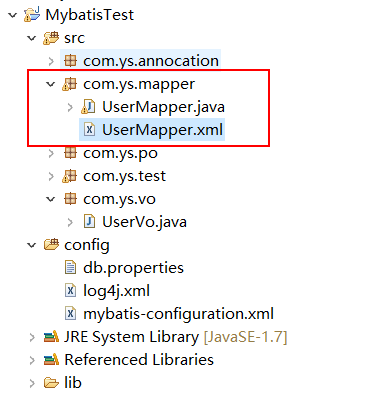mybatis 詳解(六)------通過mapper介面載入對映檔案
阿新 • • 發佈:2018-12-03
目錄
- 1、定義 userMapper 介面
- 2、在全域性配置檔案 mybatis-configuration.xml 檔案中載入 UserMapper 介面(單個載入對映檔案)
- 3、編寫UserMapper.xml 檔案
- 4、測試
- 5、批量載入對映檔案
- 6、注意
通過 mapper 介面載入對映檔案,這對於後面 ssm三大框架 的整合是非常重要的。那麼什麼是通過 mapper 介面載入對映檔案呢?
我們首先看以前的做法,在全域性配置檔案 mybatis-configuration.xml 通過 <mappers> 標籤來載入對映檔案,那麼如果我們專案足夠大,有很多對映檔案呢,難道我們每一個對映檔案都這樣載入嗎,這樣肯定是不行的,那麼我們就需要使用 mapper 介面來載入對映檔案
以前的做法:

改進做法:使用 mapper 介面來載入對映檔案
1、定義 userMapper 介面
package com.ys.mapper; import org.apache.ibatis.annotations.Delete; import org.apache.ibatis.annotations.Insert; import org.apache.ibatis.annotations.Select; import org.apache.ibatis.annotations.Update; import com.ys.po.User; publicinterface UserMapper { //根據 id 查詢 user 表資料 public User selectUserById(int id) throws Exception; //向 user 表插入一條資料 public void insertUser(User user) throws Exception; //根據 id 修改 user 表資料 public void updateUserById(User user) throws Exception; //根據 id 刪除 user 表資料 publicvoid deleteUserById(int id) throws Exception; }
2、在全域性配置檔案 mybatis-configuration.xml 檔案中載入 UserMapper 介面(單個載入對映檔案)

3、編寫UserMapper.xml 檔案
<?xml version="1.0" encoding="UTF-8" ?> <!DOCTYPE mapper PUBLIC "-//mybatis.org//DTD Mapper 3.0//EN" "http://mybatis.org/dtd/mybatis-3-mapper.dtd"> <mapper namespace="com.ys.mapper.UserMapper"> <!-- 根據 id 查詢 user 表中的資料 id:唯一識別符號,此檔案中的id值不能重複 resultType:返回值型別,一條資料庫記錄也就對應實體類的一個物件 parameterType:引數型別,也就是查詢條件的型別 --> <select id="selectUserById" resultType="com.ys.po.User" parameterType="int"> <!-- 這裡和普通的sql 查詢語句差不多,後面的 #{id}表示佔位符,裡面不一定要寫id,寫啥都可以,但是不要空著 --> select * from user where id = #{id1} </select> <!-- 根據 id 更新 user 表的資料 --> <update id="updateUserById" parameterType="com.ys.po.User"> update user u <!-- <set> <if test="username != null and username != ''"> u.username = #{username}, </if> <if test="sex != null and sex != ''"> u.sex = #{sex} </if> </set> --> <trim prefix="set" suffixOverrides=","> <if test="username != null and username != ''"> u.username = #{username}, </if> <if test="sex != null and sex != ''"> u.sex = #{sex}, </if> </trim> where id=#{id} </update> <!-- 向 user 表插入一條資料 --> <insert id="insertUser" parameterType="com.ys.po.User"> <!-- 將插入的資料主鍵返回到 user 物件中 keyProperty:將查詢到的主鍵設定到parameterType 指定到物件的那個屬性 select LAST_INSERT_ID():查詢上一次執行insert 操作返回的主鍵id值,只適用於自增主鍵 resultType:指定 select LAST_INSERT_ID() 的結果型別 order:AFTER,相對於 select LAST_INSERT_ID()操作的順序 --> <selectKey keyProperty="id" resultType="int" order="AFTER"> select LAST_INSERT_ID() </selectKey> insert into user(username,sex,birthday,address) value(#{username},#{sex},#{birthday},#{address}) </insert> <!-- 根據 id 刪除 user 表的資料 --> <delete id="deleteUserById" parameterType="int"> delete from user where id=#{id} </delete> </mapper>
4、測試
//根據id查詢user表資料 @Test public void testSelectUserById() throws Exception{ //獲取mapper介面 UserMapper userMapper = session.getMapper(UserMapper.class); User user = userMapper.selectUserById(1); System.out.println(user); session.close(); }
5、批量載入對映檔案
<mappers> <!--批量載入mapper 指定 mapper 介面的包名,mybatis自動掃描包下的mapper介面進行載入 --> <package name="com.ys.mapper"/> </mappers>
6、注意
1、UserMapper 介面必須要和 UserMapper.xml 檔案同名且在同一個包下,也就是說 UserMapper.xml 檔案中的namespace是UserMapper介面的全類名

2、UserMapper介面中的方法名和 UserMapper.xml 檔案中定義的 id 一致
3、UserMapper介面輸入引數型別要和 UserMapper.xml 中定義的 parameterType 一致
4、UserMapper介面返回資料型別要和 UserMapper.xml 中定義的 resultType 一致
